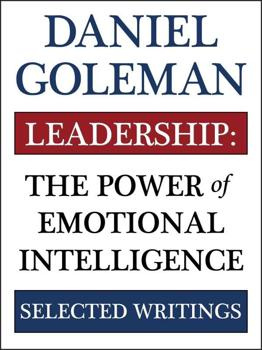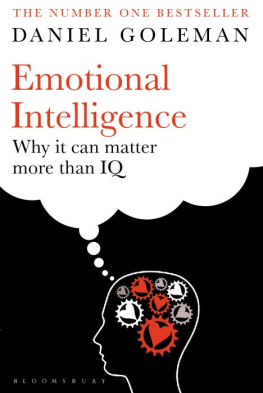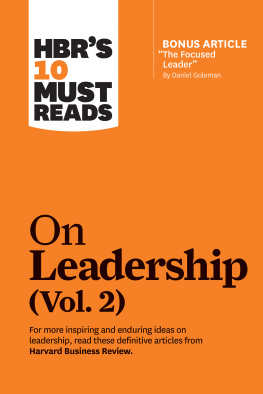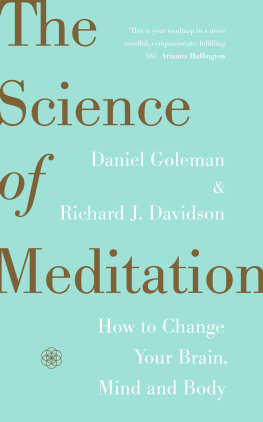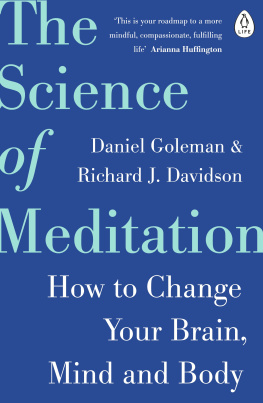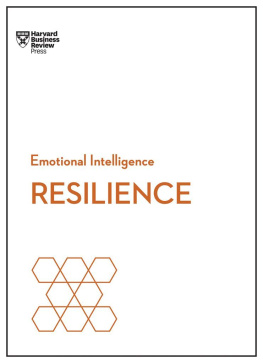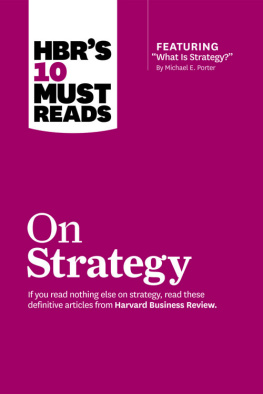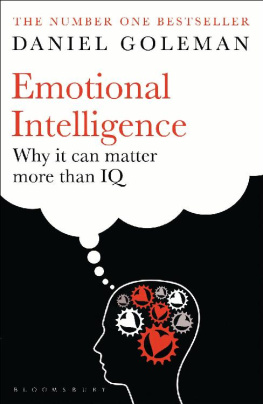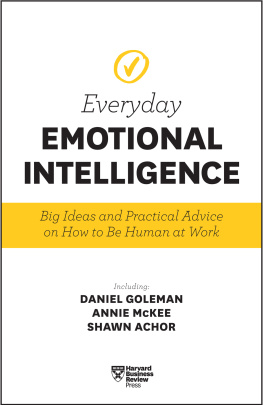A SURPRISING SYNERGY
I remember having the thought, just before Emotional Intelligence was published, that if one day I overheard a conversation in which two strangers used the words emotional intelligence and both understood what it meant, I would have succeeded in spreading the concept more widely into the culture. Little did I know.
The phrase emotional intelligence, or its casual shorthand EQ, has become ubiquitous, showing up in settings as unlikely as the cartoon strips Dilbert and Zippy the Pinhead, and in Roz Chasts sequential art in The New Yorker. Ive seen boxes of toys that claim to boost a childs EQ; lovelorn personal ads sometimes trumpet it in those seeking prospective mates. I once found a quip about EQ printed on a shampoo bottle in my hotel room.
Perhaps the biggest surprise for me has been the impact of EI (the abbreviation I prefer) in the world of business. The Harvard Business Review has hailed emotional intelligence as a ground-breaking, paradigm-shattering idea, and one of the most influential business ideas of the decade.
The decade after the 1995 publication of Emotional Intelligence saw a surge in applications of the concept to the workplace, particularly leadership screening, selection and development. And with this booming interest there grew a mini-industry of consultants and coaches, some selling their services by making claims that far outstripped the data. To set the story straight, I wrote a new introduction to the 10th anniversary edition of Emotional Intelligence. By that time there was an understandable backlash to the EI concept and the exaggerated claims being made for it among some academic psychologists. Only now, with a steady stream of better data, has much of the criticism ebbed, as a more empirical picture of the benefits of EI emerges from sound research.
The Rutgers University-based Consortium for Research on Emotional Intelligence in Organizations (CREIO) has led the way in catalyzing this scientific work, collaborating with organizations that range from the Office of Personnel Management in the Federal government to American Express.
When I wrote Emotional Intelligence, my main focus was new findings on the brain and emotions, particularly their implications for child development and schools. But I included a chapter on how this then-new concept informed our understanding of leadership, Managing With Heart. The interest in the business community was so great that my next two books were on the implications of emotional intelligence for the workplace (Working With Emotional Intelligence) and on leadership itself (Primal Leadership: Leading With Emotional Intelligence). Managing With Heart excerpted here in Chapter 2 includes some practical advice on giving constructive feedback and the consequences of giving critiques poorly. It offers a concrete example of the difference between leading with emotional intelligence, and without.
There are now three main models of EI, with dozens of variations. Each represents a different perspective. That of Peter Salovey and John Mayer rests firmly in the tradition of intelligence shaped by the original work on IQ a century ago. The model put forth by Reuven Bar-On grew from his research on well-being. And my own model focuses at the behavioral level, on performance at work and in organizational leadership, melding EI theory with decades of research on modeling the competencies that set star performers apart from average.
As I proposed in Working with Emotional Intelligence, EI abilities rather than IQ or technical skills emerge as the discriminating competency that best predicts who among a group of very smart people will lead most ably. If you scan the competencies that organizations around the world have independently determined identify their star leaders, you discover that indicators of IQ and technical skill drop toward the bottom of the list the higher the position. (IQ and technical expertise are much stronger predictors of excellence in lower-rung jobs.)
At the very highest levels, competence models for leadership typically consist of anywhere from 80 to 100 percent EI-based abilities. As the head of research at a global executive search firm put it, CEOs are hired for their intellect and business expertise and fired for a lack of emotional intelligence.
In Working with Emotional Intelligence I also proposed an expanded framework that reflects how the fundamentals of EI that is, self-awareness, self-management, social awareness, and the ability to manage relationships translate into on-the-job success. This framework is illustrated by the figure at the end of the chapter.
The business communitys fascination with emotional intelligence, particularly for leaders, caught the attention of editors at the Harvard Business Review, who asked me to write more on the subject. My resulting 1998 Review article, What Makes a Leader?, has had surprising impact as well. It quickly became one of the most-requested reprints in the Reviews history, and has been included in several leadership anthologies the Review has issued, including a collection of ten must-read articles from their pages. Youll find it in Chapter 3.
David McClelland, my mentor at Harvard, studied the motives that drove successful entrepreneurs and was himself entrepreneurial, co-founding a research and consulting outfit called McBer, which applied the competence modeling method to the organizational world. That company later became part of the Hay Group, a global consulting firm, and the research arm of McBer has become the McClelland Institute, under the leadership of other former McClelland students Jim Burrus, Mary Fontaine, and Ruth Jacobs (now Malloy). As interest in the emotional intelligence competencies mushroomed, they shared with me data they had collected on business performance and leadership styles from thousands of executives, which I reported in the Harvard Business Review article, Leadership That Gets Results reprinted here in Chapter 4.
In an economy driven by knowledge work, value gets created through the efforts of teams. This puts the focus on the group IQ, a concept devised by Robert Sternberg and Wendy Williams at Yale. The group IQ represents the sum total of each team members best talents contributed at full force. But what determines the actual productivity of that team is not its theoretical potential that is, the group IQ but rather how well that team coordinates its efforts. In other words, interpersonal harmony. I originally explored the dynamics of the group IQ in Emotional Intelligence, and then returned to the emotional dynamics of teams from the perspective of the styles of team leaders. Youll find these dynamics detailed in Chapter 5.

